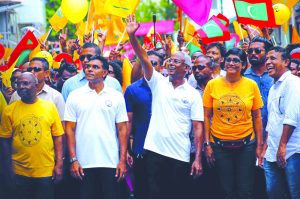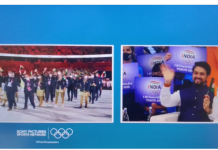 Rarely has any tiny country like the Maldives got so-much media attention as is the case with this archipelago in the Indian Ocean region after the victory of the joint opposition candidate in the just concluded presidential election there. Its strategic location has been the primary reason for India, China, the US and the European Union, besides many other countries, showing considerable interest to have their presence in the Maldives.
Rarely has any tiny country like the Maldives got so-much media attention as is the case with this archipelago in the Indian Ocean region after the victory of the joint opposition candidate in the just concluded presidential election there. Its strategic location has been the primary reason for India, China, the US and the European Union, besides many other countries, showing considerable interest to have their presence in the Maldives.
But, first of all, there is need to understand the implications of the victory of the joint opposition candidate, Ibrahim Mohamed Solih, over the incumbent President, Abdulla Yameen, for India and China, the two major contenders for influence in the Maldives. The substantial victory margin, over 17 per cent, for Solih shows how unpopular Yameen had become mainly because of his dictatorial and short-sighted policies backed by China.
Yameen, a half brother of former President Maumoon Abdul Gayoom, behaved like Indira Gandhi when he imposed an emergency in February this year after the Maldives Supreme Court ruled that jailed opposition leaders like the ex-President Mohamed Nasheed be released as the charges framed against them under the anti-terrorism law could not stand scrutiny by the country’s judiciary. Power-drunk Yameen, perhaps, thought that he could manage to cling on to power with the help of Chinese bounty in the form of a number of mega projects. However, the growing unrest in the country forced him to lift the emergency after 45 days of its imposition, providing proof that his continuance in power was doubtful. What was calculated then has been found to be true after the September 23 presidential election results.
The change of government in Male, a major setback for China, has sent across the message that any amount of money spent on welfare schemes cannot buy people’s support unless they are convinced that their government cares for their basic freedoms, is not tyrannical and formulates policies as dictated by the country’s own interests. Yameen’s too much tilt towards China could not be swallowed by the Maldivians, well aware of China’s dictatorial handling of the aspirations of the Tibetans and the Uyghurs in Xinjiang.
Yameen’s defeat at the hands of Solih is a moment of joy not only for India but also for democracy-lovers all over the world. The opportunity that has come India’s way calls for careful handling of the emerging situation in the Maldives. The President-elect of the Maldives has a soft corner for India but he would like to be given equal treatment by New Delhi, which need to come forward with development projects and financial assistance enough for Male to forget about the flow of funds from Beijing.
Prime Minister Narendra Modi’s congratulatory telephone call, conveying his “good wishes for the strengthening of democracy, peace and prosperity” in the Maldives under the leadership of Solih, must have gone down well with the President-elect. This shows that India is ready with all kinds of help it can provide as a next-door neighbour, but it all depends on how New Delhi succeeds in persuading the new Maldivian rulers to infuse a fresh lease of life into their ‘India First’ policy. The External Affairs Ministry also issued a statement, saying, “This election marks not only the triumph of democratic forces in the Maldives, but also reflects the firm commitment to the values of democracy and the rule of law.”
The successful completion of the third democratic election process in the Maldives does indicate that democracy is growing roots in this SAARC (South Asian Association for Regional Cooperation) member-nation slowly but surely. Now it is the responsibility of India and the West to mend their fences with Male in a friendly manner, ending the bitterness of the past.
One can get a peep into minds of the new rulers in Male by going through what a former Foreign Minister of the Maldives and daughter of Gayoom, Dunya Maumoon, told an Indian journalist after Solih’s election was confirmed: “India remains a close friend and will continue to remain so. But India has to learn to respect a small country like the Maldives. We may be tiny, but we don’t care for bullying tactics. We understand India’s security concerns as China has moved much closer here, and we will be sensitive to it.”
Dunya, who is likely to be a minister again, has expressed the view that her country may not pursue a policy to damage Male’s relations with Beijing, but would prefer to adopt a balanced approach while responding to offers of any kind of help from neighbours like India and China. The new government of the Maldives will be “looking for a more balanced relationship”, as she pointed out. This clearly means that efforts would be made by Male to save the tiny Indian Ocean country from slipping into a situation of “debt bondage” of China, which is part of the latest policy of Beijing, too visible in the case of Pakistan. Till the end of the Yameen regime the Maldives had been moving towards getting entrapped by China’s aid politics, but the situation may get reversed if the new government continues to function smoothly.
India established its diplomatic mission in Male over four decades ago, but its presence there is very limited compared to that of China, which set up its embassy in 2011. China today has a free trade agreement with the Maldives, but India has no such arrangement. Beijing boosted its relations with Male through a string of mega projects relating to various key areas like infrastructure development, leaving India far behind.
China’s mega projects-driven foreign policy needs to be responded to by India in the same manner. The significance of the need for India’s increased presence in the Maldives, hardly 1200 km from the Indian mainland, can be understood from the fact that more than 97 per cent of our international trade is conducted through the Indian Ocean where the Maldives is located. The Indian Ocean area has as many as 44 countries, home to 40 per cent of the world’s population.
India has had the best of relations with the Maldives during the 30-year-long rule of Maumoon Abdul Gayoom there. In 1988, when a group of mercenaries threatened to take over the government there through a coup, India was the first country to be approached for help, and it responded through its Operation Cactus, ending the threat forever.
India’s relations with the Maldives continued to grow even when Mohamed Nasheed replaced Gayoom in 2008 as the first democratically elected President. Indian firm GMR Infrastructure was given the biggest $511 million contract for the development of Male international airport, besides other projects, during the Nasheed government, but it was terminated by his successor, Mohamed Waheed Hassan.
The situation took a more painful turn with Yameen taking over as President in Male. He fell into the Chinese debt trap laid through Beijing’s String of Pearls policy. Yameen changed the law to allow Chinese firms’ ownership of the land where they set up their business establishments, resulting in great resentment against his rule. Opposition parties displayed rare unity to express their concern against this dangerous policy of Yameen through street protests and other means, awakening the public about the disturbing development in the name of economic advancement.
However, it will be quite tricky for the new government in Male to get the archipelago disentangled from China and extend its hands of cooperation towards other nations like India. How the Solih government plays its cards will be interesting to watch.
letters@tehelka.com












